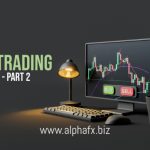Forex is the largest and fastest growing financial market in the world, it has grown to a daily trade volume of more than $5 trillion USD – approximately 200 times bigger than the New York Stock Exchange.
It offers great opportunities to everyone interested in making money and this has attracted the attention of many individuals seeking financial freedom. – See the Benefits of Trading in the Forex Market
With so many different strategies abounding about how to make money in Forex, it is no wonder that a lot of people are quite confused about how to get started and succeed. In order to really make some serious money in Forex, you need to take a few things into consideration. Below are 3 ways to ensure a pathway to success, and to make consistent profit in the Forex market.
Your first goal is to take the time and effort to really determine your profit targets. Once you have determined this, these three suggestions will help you significantly. Using them in all of your transactions can help you a lot, but these are only a handful of suggestions and should never be considered as an all-inclusive solution to your needs.
1. Education and Training
If you’re a beginner in the Forex market, you’ll need to prepare yourself in order to survive, let alone become successful. This is where ‘knowledge’ is essential.
It is essential to master the different terminologies, concepts and processes that are involved in forex trading. An educational investment will give you the tools and confidence you’ll need to succeed in the markets.
Succeeding in Forex trading does require intense learning and knowledge. Beginners need to learn how to chart and analyse market movements, and to determine their entry and exit points. Forex trading involves knowing when to buy and when to sell. When studying Forex trading, you’ll also learn about margins, bids, order types, rollovers, leveraging and other trading basics. Trading philosophies should also be studied before entering into forex trading. Strengthening certain psychological traits like discipline, commitment, patience and risk management, will help you to better handle the certain pressures of trading.
There are several ways to get acquainted with the skills and knowledge required for forex trading, e.g. live seminars/workshops, trading books and online webinars. Each training method has its own advantage, so be sure to research your options and choose the one that meets your needs. Live seminars/workshops deliver vital information on a one-to-one basis. Trading books provide a wealth of information that you can easily refer to anytime you need it. Online courses provide 24/7 access to trading knowledge. It’s up to you to decide which method suits you best.
2. Trading plan (Trading Systems and Trading Strategies)
Just as no business can succeed without a business plan, the same principle applies to Forex Trading.
For successful and profitable trading, a Forex trading plan is needed – which consists of a combination of trading systems and trading strategies.
A Forex trading plan is a personalised plan that includes all the information and related activities/tasks that need to be met to trigger or exit a trade. The main purpose of having a Forex trading plan is to stay focused, and streamline decision making to reduce stress, and emotion-based or unplanned trades. The trading plan needs to be created around the trader’s individual lifestyle, but the principle is the same. You will learn to create your personalised trading plan using the demo account, although the emotions of trading on a demo account is different to when trading with a live account. A trader that wants to be profitable must paper (demo) trade to their personal strategy(ies), make modifications where appropriate, and make consistent profit before considering opening a live account
3. Management of Risk
The third tip is the vital task of risk management
A trader can have the best trading system, and yet struggle to achieve profitability if proper risk management is not practised.
Risk management is a combination of multiple ideas to control your trading risk. It can be limiting your trade lot size, hedging, trading only during certain hours or days, or knowing when to cut one’s losses short and move on to look for a new trade or opportunity.
In conclusion, the Forex market can be extremely complicated and complex if the trader does not have a proper foundation of knowledge.


